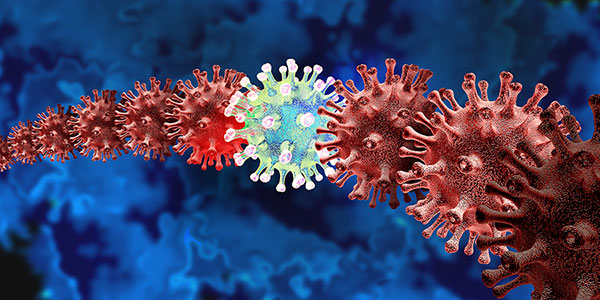COVID scored second only to election results as the most searched Goggle topic in 2020, and it’s no surprise. Over 600,000 Americans have died from the virus, 20 million lost their jobs, and tens of millions lost their homes. The virus devastated our economy and social lives, as well as our confidence.
On Jan. 13, Harrison County hit its peak of daily cases at 251, with a seven-day average of 169. Then our vaccination efforts kicked in, so by the end of March, we counted only 21 new cases, with a weekly average of only 13. By July 4, 2 million doses of vaccine had been given to Mississippians, resulting in 30 percent of our population being fully vaccinated.
Despite the fall in cases, with this low a vaccination rate, Mississippians are particularly susceptible to the new coronavirus variant, known as delta. First identified in India in October, it now has been identified in more than 80 countries and all 50 U.S. states. Because it’s more contagious than other variants, Dr. Anthony Fauci, director of the National Institute of Allergy and Infectious Diseases, said that the delta variant is the “greatest threat” in the world’s efforts to contain COVID-19. It’s believed to be 60 percent more transmissible than previous variants.
No vaccine of any kind is 100 percent effective in preventing an infection, so even those vaccinated might catch COVID. However, statistics show that those who are vaccinated, if they do catch the virus, will fare much better. Those who are vaccinated reduce the likelihood of catching the virus, being hospitalized and dying of it. Of the more than 18,000 COVID-19 deaths recorded in May, only around 150, or 0.8 percent, were fully vaccinated people.
Latest studies confirm that all the vaccines are effective against the delta variant, although not as effective as against other variants. For example, current vaccines are thought to be around 95 percent effective against the alpha strain, but only 80 percent against delta. Even so, the vaccines still dramatically reduce the virus’s toxic effects.
Older people and those with pre-existing conditions tend to have worse outcomes from COVID infection. While nearly 50 percent of all who’ve died from the virus were 75, over a quarter were under 65. Even children are at some risk of dying or developing chronic disability, such as heart disease. Infected children may become asymptomatic transmitters of the disease.
While many treatments have been tried, from chloroquine to witch hazel, the only effective treatment for coronavirus is a monoclonal antibody infusion. Monoclonal antibodies are laboratory-made proteins that mimic the immune system’s ability to fight off harmful pathogens like the coronavirus.
These infusions are reserved for high-risk patients, specifically those older than 65 or age 55 or older with heart or lung disease. Chronic conditions, such as obesity, chronic kidney disease or diabetes, also qualify. Antibiotics have no effect on the virus.
The most common symptoms of a coronavirus infection are sinus-related, including stuffiness and cough. Some people lose their sense of taste or smell, and others have digestive issues. Most people feel better within two or three weeks of COVID-19 infection. Once it has been 10 days since coronavirus symptoms first appeared and symptoms have resolved, the CDC suggests most people are no longer able to infect others.
To help stop coronavirus and protect yourself and your community, be sure to get vaccinated and encourage others to do so. Meanwhile, when indoors among crowds, such as shopping or at meetings, Centers for Disease Control and Prevention recommends community use of masks, specifically non-valved, multi-layer cloth masks.
Be aware that just because we’ve made great progress on reducing the dangerous spread of this virus, with new variants, we must all take responsibility to become vaccinated.
WHEN TO GET HELP
Emergency signs of COVID infection requiring being checked at the emergency room:
- Trouble breathing
- Persistent pain or pressure in the chest
- New confusion
- Inability to wake or stay awake
- Bluish lips or face
Dr. Philip L. Levin is a retired emergency medicine specialist in Gulfport. Learn more or contact him at www.Doctors-Dreams.com.



